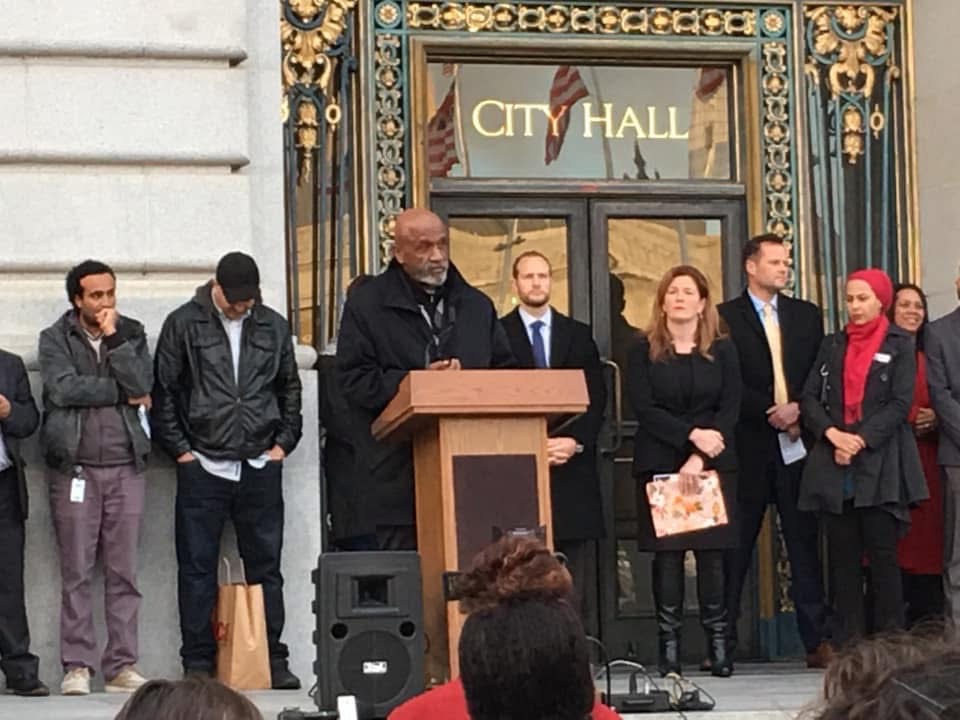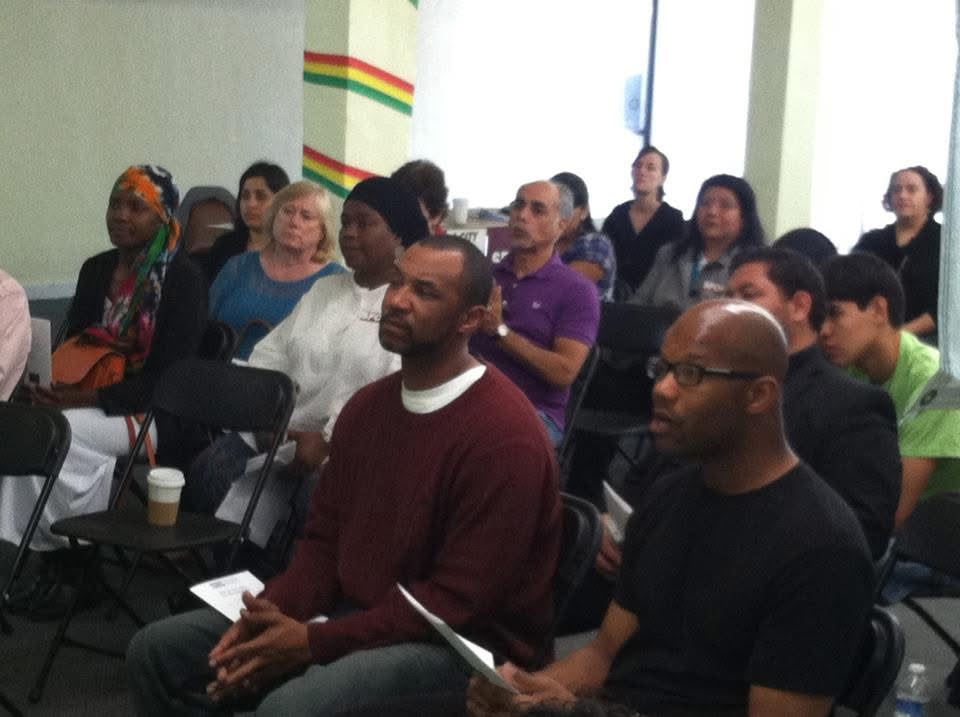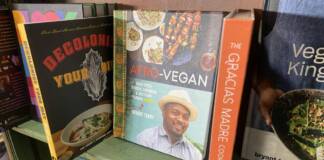
by JR Valrey, The People’s Minister of Information
The San Francisco Muslim Community Center is returning to the Fillmore neighborhood, after relocating to the Excelsior neighborhood 13 years ago. Its temporary home is at the African American Art and Culture Complex, 762 Fulton Ave. in San Francisco, currently.
Fresh produce boxes are given away every first and third Saturday, while the San Francisco Muslim Community Center also offers prayers, study and counseling among other things. I talked with Salah Abu Muna about the recent happenings going on with the SMCC.
JR Valrey: What is the history of the San Francisco Muslim Community Center? What kind of services do you offer?
Salah Abu Muna: The San Francisco Muslim Community Center was organized under the leadership of Imam W. Deen Mohammed in 1978 by African American Muslims who were members of the former Nation of Islam led by his father Elijah Muhammad. His (IWDM) knowledge of the religion of Al-Islam and his scriptural insight helped believers understand how to live the teachings of Al-Islam as a way of life that aligns our religious devotion and purpose of serving God and humanity inside the context of our experience in American society.
In 1981 the SFMCC became a nonprofit 501(c)(3) religious corporation, established to provide worship, education, and social services that support the spiritual and practical needs of Muslims in the San Francisco Bay Area. From its beginning, the SFMCC’s mission has also included service to humanity whenever possible and within the means of the community.
The Muslim population in San Francisco has changed many times over the years. The early work of SFMCC focused on African American Muslims, then gradually included a wider group of believers — Arabs, Africans, Pakistanis, Latinos, and indigenous and European American converts. Over the decades, SFMCC has officiated more than 150 marriages and guided hundreds of new Muslims in learning the principles and practices of faith, including prayer, fasting, charity and pilgrimage.
For over 30 years, SFMCC operated as a tenant while continuing to search for a permanent home that could meet the needs of a growing and active congregation. The community rented space in public halls and community centers to host services, educational programs and interfaith gatherings.
In 2012, SFMCC relocated from its original base in the Fillmore District to Mission Street in the Excelsior neighborhood. Gentrification and redevelopment in the Fillmore made it difficult for faith institutions and community programs to remain there, and the move offered a more affordable space for continued worship and service. After more than a decade at that site, increasing rent and building conditions again made relocation necessary.
Now, in 2025, SFMCC has returned to the Fillmore and Western Addition area, establishing its permanent home on Haight Street. The property belongs to a longtime member of the congregation who made it available for the community’s ongoing use. This return reconnects the Center to its original roots and to a neighborhood that holds deep meaning for San Francisco’s African American community.
While the new facility is being prepared for full operation, the Center holds weekly Friday congregational prayer at the African American Art and Culture Complex, located at 762 Fulton St. The Complex provides an accessible and welcoming space for continued worship and community life. From the same site, SFMCC distributes free boxes of fresh produce every first and third Saturday of each month, serving residents, families and elders from across the neighborhood.
The Center continues to provide prayer, study, food distribution and counseling and is preparing to relaunch its addiction and recovery program in response to San Francisco’s ongoing opioid and stimulant crisis, which weighs heavily on African American residents.
Through every stage of change, SFMCC has remained steady in its purpose — to serve Allah through service to people, to maintain a place of worship grounded in dignity and learning, and to preserve the presence of an African American-led Muslim community in San Francisco.
JR Valrey: Can you talk about your recent move? What do you offer at your new location?
Salah Abu Muna: The San Francisco Muslim Community Center has relocated from Mission Street in the Excelsior District to Haight Street in the Fillmore. The rent at the former site rose beyond what we could sustain, and the building developed conditions that made it unsafe to continue our programs. The move allows us to protect the congregation and build toward long-term stability.
The property on Haight Street belongs to a longtime member of our community who made it available for the Center’s permanent use. Work is underway to prepare the building for full operation. During this time, Friday congregational prayer takes place at the African American Art and Culture Complex on Fulton Street.
Our programs remain active. We continue food distribution, counseling and community referrals in partnership with the San Francisco-Marin Food Bank. Educational and faith-based activities are expanding online so members can stay involved throughout this transition.
We are also planning to relaunch our addiction and recovery programs in the near future. The crisis of opioid and stimulant use continues in San Francisco and weighs heavily on African American residents. This work is part of our broader commitment to healing and community care — to meet people where they are and help restore balance in their lives.
This move brings us close to our beginnings. SFMCC started on Divisadero Street, then moved to the Excelsior around 2012 as gentrification changed the Fillmore. Returning now to Haight Street reconnects us with our roots in the Fillmore and Western Addition neighborhoods. The area holds deep African American history, and our community, founded in 1978, remains San Francisco’s only African American–led Muslim congregation. The move continues that legacy of faith, service and endurance.
JR Valrey: What is the difference between a Muslim Community Center and a Masjid?
Salah Abu Muna: A masjid is established for prayer. It is the sacred space where believers come together to remember Allah, discipline the heart and renew faith through worship.
A Muslim Community Center continues that sacred work but carries it into community life. It becomes a place for education, service, counseling and public engagement. The Prophet Muhammad, peace be upon him, built the first masjid as both a house of worship and a center for the guidance and wellbeing of the people. That balance remains our model.
Many masjids today also carry out this broader work, offering classes, social programs and support for their neighborhoods. When the San Francisco Muslim Community Center was founded, it was important to name that purpose clearly and to build an institution whose identity joined worship with public service. The name “Community Center” signaled our duty to nurture the full life of the people, not only their religious observance.
Under the leadership of Imam Abu Qadir Al-Amin, SFMCC became active in advocacy and civic partnership — helping families, supporting re-entry after incarceration, and working across lines of faith. Imam Abu Qadir served on the San Francisco Interfaith Council and guided programs that addressed addiction, recovery, and rehabilitation. His work helped form partnerships later strengthened through the San Francisco Foundation’s FAITHS Program, which unites congregations and community organizations in service to the public good.
Through this vision, SFMCC joins worship with social concern. The masjid sustains the prayer life; the Center gives structure to community life. Both stand on the same foundation— obedience to Allah expressed through service to humanity.

JR Valrey: Are your services for everybody, or just for Muslims?
Salah Abu Muna: As a federally recognized 501(c)(3) nonprofit organization, the San Francisco Muslim Community Center does not and cannot discriminate on the basis of race, color, religion, national origin, ancestry, sex, gender, gender identity or expression, sexual orientation, age, disability, medical condition, marital status, military or veteran status, or any other status protected by law.
Our services are open to everyone. The Qur’an teaches that all people are created from a single soul, and that faith calls us to serve creation without distinction.
We serve Muslims through prayer, study and counseling. We also serve the broader community through food distribution, educational programs and recovery support. From the African American Art and Culture Complex, where we hold Friday prayer, we distribute free produce every first and third Saturday of each month. These efforts nourish both body and spirit and strengthen the bonds of neighborhood life.
This approach continues the vision of our former leader, Imam Abu Qadir Al-Amin, who was appointed by Imam Warith Deen Mohammed to establish this Center in San Francisco. He taught that community life must include care for those returning from incarceration, those in recovery, and those facing hardship. His leadership joined worship with advocacy and built a model of service that continues to guide us.
Our work aligns with the San Francisco Foundation’s FAITHS Program, which connects faith-based organizations with civic efforts to build equity and shared wellbeing. We strive to ensure that our programs serve all people—not only Muslims—through education, outreach and public service. Each act of service is part of our worship, and every person we serve is part of our shared community life.
JR Valrey: What are your thoughts on the U.S. government’s attack on SNAP and Section 8 in the Bay?
Salah Abu Muna: When policy withdraws food and housing from people, it breaks the trust that holds a nation together. Hunger and displacement are not random; they follow choices that value markets more than human lives. The language of “efficiency” and “budget control” hides a moral decision — to look away from need.
In the Bay Area, the cost of a single room rivals a family’s income. People line up at places of worship and community centers because public systems no longer reach them. The Qur’an names this as a sign of decay within the social order: neglect of the hungry, neglect of shared duty.
Our responsibility is to keep care alive. Feeding others, protecting shelter, and maintaining dignity are acts of faith. They renew the contract between people and their Creator. A place of worship, a kitchen, a home — each becomes sacred when compassion governs the act.
JR Valrey: What are your thoughts on the U.S. government’s attack on immigrants, and how has it affected people in the masjid?
Salah Abu Muna: Immigration policy in this country often ignores the basic truth that every person is part of one human family. People move because they are seeking safety, work and a better life for their children. When the law treats that movement as a crime, it damages the moral health of the whole society.
In our place of worship, we see people from many nations come together in one prayer line. Some have lived here for years; others are new. Each one brings knowledge, skill and experience that strengthen the community. They contribute quietly, without complaint, but the fear of deportation or discrimination weighs on them.
Our duty is to offer stability and respect. The place of worship should be a center of guidance and support, not just a location for prayer. We help people find resources, understand their rights, and build confidence that they belong to something larger than any government.
Faith teaches us that the earth belongs to Allah. Human beings are caretakers, not owners. When we treat one another with fairness, we protect that trust. In doing so, we make our community stronger and our worship more sincere.
JR Valrey: How can people get more information online?
Salah Abu Muna: Visit https://www.sf-mcc.org/.
JR Valrey is a veteran journalist who can be heard weekly on Wednesdays on 89.5FM KPOO or KPOO.com from noon to 3 p.m. His work can also be heard on www.blockreportradioworld.com.




